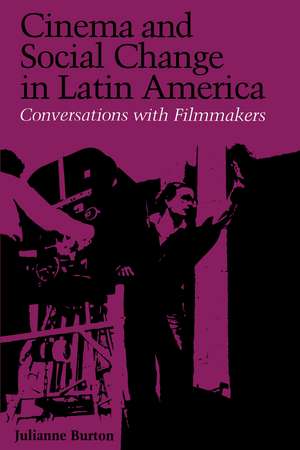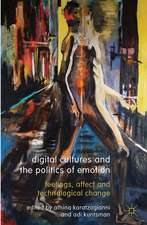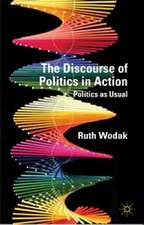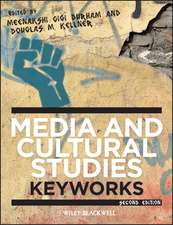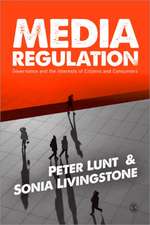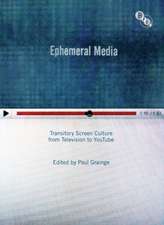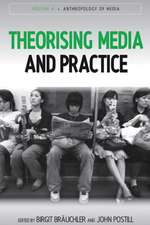Cinema and Social Change in Latin America: Conversations with Filmmakers: LLILAS Special Publications
Editat de Julianne Burtonen Limba Engleză Paperback – noi 1986
In Cinema and Social Change in Latin America, Julianne Burton presents twenty interviews with key figures of Latin American cinema, covering three decades and ranging from Argentina to Mexico. Interviews with pioneers Fernando Birri, Nelson Pereira dos Santos, and Glauber Rocha, renowned feature filmmakers Tomás Gutiérrez Alea and Carlos Diegues, prize-winning documentarists Patricio Guzmán and Helena Solberg-Ladd, among others, endeavor to balance personal achievement against the backdrop of historical, political, social, and economic circumstances that have influenced each director's career. Presented also are conversations that cast light on the related activities of acting, distribution, theory, criticism, and film-based community organizing.
More than their counterparts in other regions of the world, Latin American artists and intellectuals acknowledge the degree to which culture is shaped by history and politics. Since the mid-1950s, a period of rising nationalism and regional consciousness, talented young artists and activists have sought to redefine the uses of the film medium in the Latin American context. Questioning the studio and star systems of the Hollywood industrial model, these innovators have developed new forms, content, and processes of production, distribution, and reception.
The specific approaches and priorities of the New Latin American Cinema are far from monolithic. They vary from realism to expressionism, from observational documentary to elaborate fictional constructs, from "imperfect cinema" to a cinema that emulates the high production values of the developed sectors, from self-reflexive to "transparent" cinematic styles, from highly industrialized modes of production to purely artisanal ones. What does not vary is the commitment to film as a vehicle for social transformation and the expression of national and regional cultural autonomy.
From early alternative cinema efforts in Argentina, Brazil, and Cuba to a contemporary perspective from within the Mexican commercial industry to the emerging cinema and video production from Central America, Cinema and Social Change in Latin America offers the most comprehensive look at Latin American film available today.
Preț: 240.63 lei
Nou
Puncte Express: 361
Preț estimativ în valută:
46.05€ • 49.24$ • 38.39£
46.05€ • 49.24$ • 38.39£
Carte tipărită la comandă
Livrare economică 17 aprilie-01 mai
Preluare comenzi: 021 569.72.76
Specificații
ISBN-13: 9780292724549
ISBN-10: 0292724543
Pagini: 320
Dimensiuni: 152 x 229 x 21 mm
Greutate: 0.48 kg
Editura: University of Texas Press
Colecția University of Texas Press
Seria LLILAS Special Publications
ISBN-10: 0292724543
Pagini: 320
Dimensiuni: 152 x 229 x 21 mm
Greutate: 0.48 kg
Editura: University of Texas Press
Colecția University of Texas Press
Seria LLILAS Special Publications
Notă biografică
Julianne Burton-Carvajal is a professor emerita of literature at the University of California—Santa Cruz.
Cuprins
- Acknowledgments
- Introduction
- Part I. The Documentary Impulse: The Drama of Reality
- 1. Fernando Birri (Argentina), The Roots of Documentary Realism
- 2. Mario Handler (Uruguay), Starting from Scratch: Artisanship and Agitprop
- 3. Jorge Silva and Marta Rodríguez (Colombia), Cine-Sociology and Social Change
- 4. Jorge Sanjinés (Bolivia), Revolutionary Cinema: The Bolivian Experience
- 5. Patricio Guzmán (Chile), Politics and the Documentary in People’s Chile
- 6. Emilio Rodríguez Vázquez and Carlos Vicente Ibarra (Puerto Rico and Nicaragua), Filmmaking in Nicaragua: From Insurrection to INCINE
- 7. Helena Solberg-Ladd (Brazil and United States), The View from the United States
- Part II. Fictional Filmmaking: The Reality of Drama
- 8. Glauber Rocha (Brazil), Cinema Novo and the Dialectics of Popular Culture
- 9. Tomás Gutiérrez Alea (Cuba), Beyond the Reflection of Reality
- 10. Nelson Pereira dos Santos (Brazil), Toward a Popular Cinema
- 11. Humberto Solás (Cuba), Every Point of Arrival Is a Point of Departure
- 12. Antonio Eguino (Bolivia), Neorealism in Bolivia
- 13. Carlos Diegues (Brazil), The Mind of Cinema Novo
- 14. Raúl Ruiz (Chile and France), Between Institutions
- 15. Marcela Fernández Violante (Mexico), Inside the Mexican Film Industry: A Woman’s Perspective
- Part III. Behind the Scenes
- 16. Nelson Villagra (Chile), The Actor at Home and in Exile
- 17. Walter Achugar (Uruguay and Latin America at Large), Using Movies to Make Movies
- 18. Enrique Colina (Cuba), The Film Critic on Prime Time
- 19. Julio García Espinosa (Cuba), Theory and Practice of Film and Popular Culture in Cuba
- 20. Alfonso Gumucio Dagrón (Bolivia and Latin America at Large), A Product of Circumstances: Reflections of a Media Activist
- For Further Reading
- Appendix: Films and Writings by Latin American Directors
- Index of Films
- General Index
Descriere
Twenty interviews with key figures of Latin American cinema, covering three decades and ranging from Argentina to Mexico
